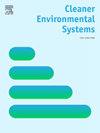注意方法!对用于评估饮食对环境影响的方法选择进行系统的文献综述
IF 4.9
Q2 ENGINEERING, ENVIRONMENTAL
引用次数: 0
摘要
我们的粮食系统是环境影响的主要驱动因素,而这些影响的很大一部分是由于动物性食品以及粮食损失和浪费。近年来,许多研究都着眼于我们的饮食对环境的影响,通常是在向行星健康饮食或其他环保饮食转变的背景下发表的。因此,每项研究都依赖于一些影响计算的方法决定。我们系统地回顾了文献中评估饮食环境性能的方法学决策。我们检索了Web of Science数据库,确定了1992年至2022年间发表的301项相关研究。目的是分析方法学方法的可比性,而不是评价个别研究的结果。该综述强调了方法上的挑战,因为可以做出许多不同的方法选择,但并非所有的方法都是正确的,而且往往会导致高估或低估所计算的影响。例如,一半的研究只考虑了一个环境问题,主要是气候变化,只有三分之一的评估考虑了生命周期的所有阶段。我们还发现缺乏透明度,特别是在如何考虑粮食损失和浪费方面。除非我们的方法正确和一致,否则我们可能无法衡量正确的事情,并掩盖影响类别或生命周期阶段的影响之间的权衡。因此,我们呼吁提高透明度,对饮食的环境绩效进行更加标准化和全面的评估。本文章由计算机程序翻译,如有差异,请以英文原文为准。

Mind the method! A systematic literature review of the methodological choices used to assess the environmental impacts of diets
Our food system is a major driver of environmental impacts, and a large proportion of these impacts are due to animal-based foods and food loss and waste. In recent years, many studies have been published looking at the environmental impact of our diets, often in the context of a shift towards a Planetary Health Diet or other environmentally friendly diets. Each study hereby relies on a number of methodological decisions that affect the calculations. We systematically reviewed the methodological decisions made for assessing the environmental performance of diets in literature. We searched the Web of Science database and identified 301 relevant studies published between 1992 and 2022. The aim was to analyse the comparability of methodological approaches, not to evaluate results of individual studies. The review highlights methodological challenges, as many different methodological choices can be made, not all of which can be correct and can often lead to over- or underestimation of the calculated impacts. For example, half of the studies considered only one environmental concern, mostly climate change, and only a third of the assessments considered all life cycle stages. We also found a lack of transparency, particularly when it comes to how food loss and waste are taken into account. Unless we get our methodologies right and aligned, we risk not measuring the right things and masking trade-offs between impacts in impact categories or life cycle stages. We therefore call for greater transparency and a more standardised and holistic assessment of the environmental performance of diets.
求助全文
通过发布文献求助,成功后即可免费获取论文全文。
去求助
来源期刊

Cleaner Environmental Systems
Environmental Science-Environmental Science (miscellaneous)
CiteScore
7.80
自引率
0.00%
发文量
32
审稿时长
52 days
 求助内容:
求助内容: 应助结果提醒方式:
应助结果提醒方式:


